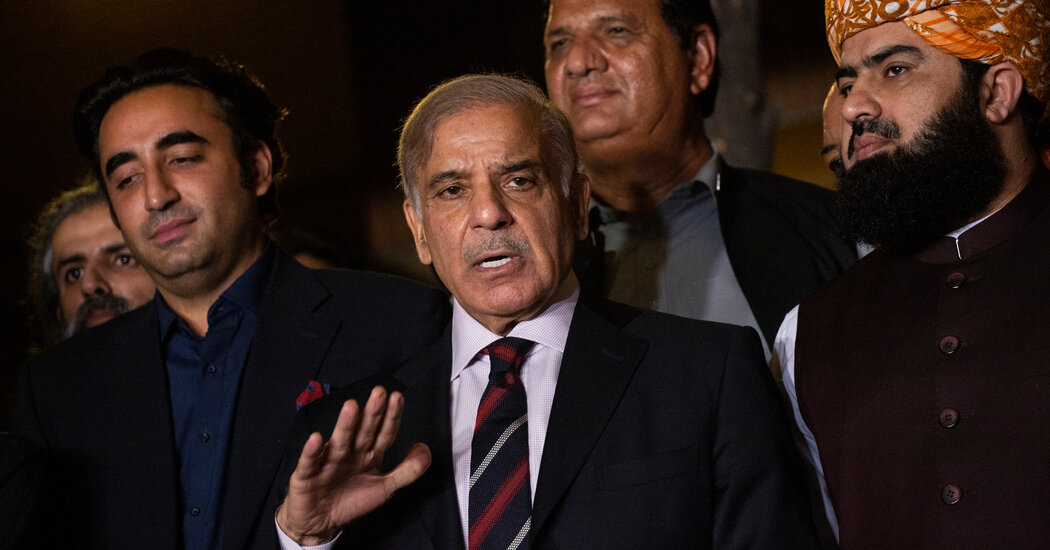Shehbaz Sharif Becomes Interim Prime Minister of Pakistan
ISLAMABAD, Pakistan — The Pakistani Parliament selected the opposition leader Shehbaz Sharif to become the country’s interim prime minister on Monday, ushering in a new government after the ouster of Imran Khan and capping a week of political turmoil that pushed the fragile democracy to the brink.
The vote came two days after Mr. Khan, the former cricket star turned politician, was removed from office in a no-confidence vote in Parliament after he lost the support of top military leaders late last year.
The political crisis escalated last week after Mr. Khan demonized the opposition as traitors, and defied the Constitution to dissolve Parliament in an effort to block the vote — stoking fears that the country’s powerful military might intervene, as it has several times before in Pakistan’s tumultuous 75-year-history.
Members of Mr. Khan’s party, Pakistan Tehreek-e-Insaf or P.T.I., boycotted the vote on Monday in the National Assembly to elect the new prime minister — a move to undercut the new government’s legitimacy as the country heads into a highly charged election season, analysts say.
The motion to elect Mr. Sharif as prime minister was passed with 174 votes, two more than the requisite simple majority.
Mr. Sharif, 70, takes power at a time of deep political divisions and economic tumult in Pakistan, a nuclear-armed nation home to 220 million people. His government faces a stalled economy that has struggled with double-digit inflation and immense national debt, and make good on his promise to pass electoral reforms to ensure that elections expected by the end of this year are free and fair.
Many also expect Mr. Sharif will try to improve Pakistan’s broken ties with the United States. Pakistan’s military leaders, who historically have guided the country’s foreign and security policies, have recently expressed their interest in improving relations with the United States, as well.
But Mr. Sharif must walk a fine line, repairing the country’s relationship with the United States without playing into Mr. Khan’s narrative that American officials conspired with opposition parties to oust him from power. That accusation has already become a central part of Mr. Khan’s campaign ahead of the next elections.
As the new prime minister, Mr. Sharif will preside over a coalition of several political parties that had united around the goal of voting Mr. Khan out of office. But those parties historically have been at loggerheads, and it is unclear whether they will remain united as elections approach.
“In Pakistan, there’s always a lot of serious challenges and political uncertainty, but he’s coming in at a particularly challenging time compared to earlier governments,” said Ijaz Khan, the former chairman of the department of international relations at the University of Peshawar.
Mr. Sharif is the younger brother of Nawaz Sharif, who served as prime minister three times, and like other family members, he has been dogged by allegations of widespread graft and malfeasance that were the focus of several corruption investigations. The younger Sharif’s rise to prime minister offers a rebuke to Mr. Khan’s professed mission of dismantling Pakistan’s political dynasties and rooting out corruption in politics.
Mr. Sharif was made the standard-bearer of the Pakistan Muslim League-Nawaz by his elder brother in July 2017, and he was officially elected party leader in March.
Nawaz Sharif, whose second term was cut short by a military coup in 1998, has consistently feuded with the country’s domineering military establishment. But Shehbaz Sharif is considered to have better relations with the generals.
Mr. Khan, the former prime minister, also had a falling out with the military over foreign policy and top military appointments. Mr. Sharif is expected to fare better thanks to his cautious and calibrated approach, analysts say.
Though he is seen as popular, Mr. Sharif’s political career has also been riddled with controversy. He has been criticized for doing too little to curb extremist sectarian groups in Punjab Province during his three terms as chief minister there, and he has been accused of ordering extrajudicial killings.
In 2003, a court issued an arrest warrant for Mr. Sharif after he was accused of ordering the extrajudicial killings of several people in 1998, charges of which he was acquitted in 2008. He was arrested in 2018 by the anticorruption authorities after being accused of misconduct in a low-cost housing program introduced during his tenure as chief minister of Punjab. And he was arrested again in 2020 on corruption-related charges.
Mr. Sharif has denied all of the graft allegations, characterizing them as politically motivated.
As the chief minister of Punjab, he led the country’s most populous province and its political power base, where the Sharif dynasty has dominated politics since the 1980s.
In that role, Mr. Sharif developed a reputation for his administrative skills and for presiding over a high-profile campaign of infrastructure improvement and social development programs.
He also became known for his high-energy style of governance, including surprise inspection “raids” of hospitals and schools, even in Punjab’s smaller towns, and his aides describe him as a workaholic with a taste for 7 a.m. staff meetings.
His record delivering large infrastructure projects at a fast pace has been a defining feature of his political career and helped him win significant public support.
Check out our Latest News and Follow us at Facebook
Original Source







